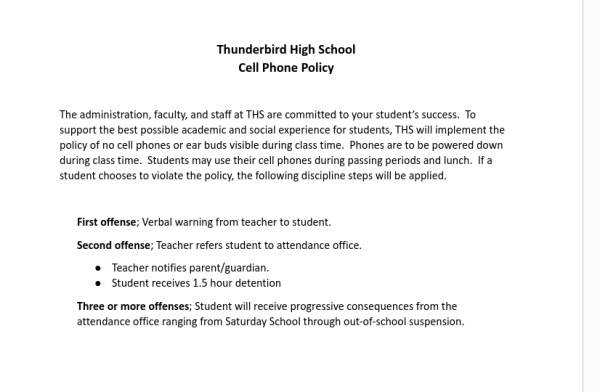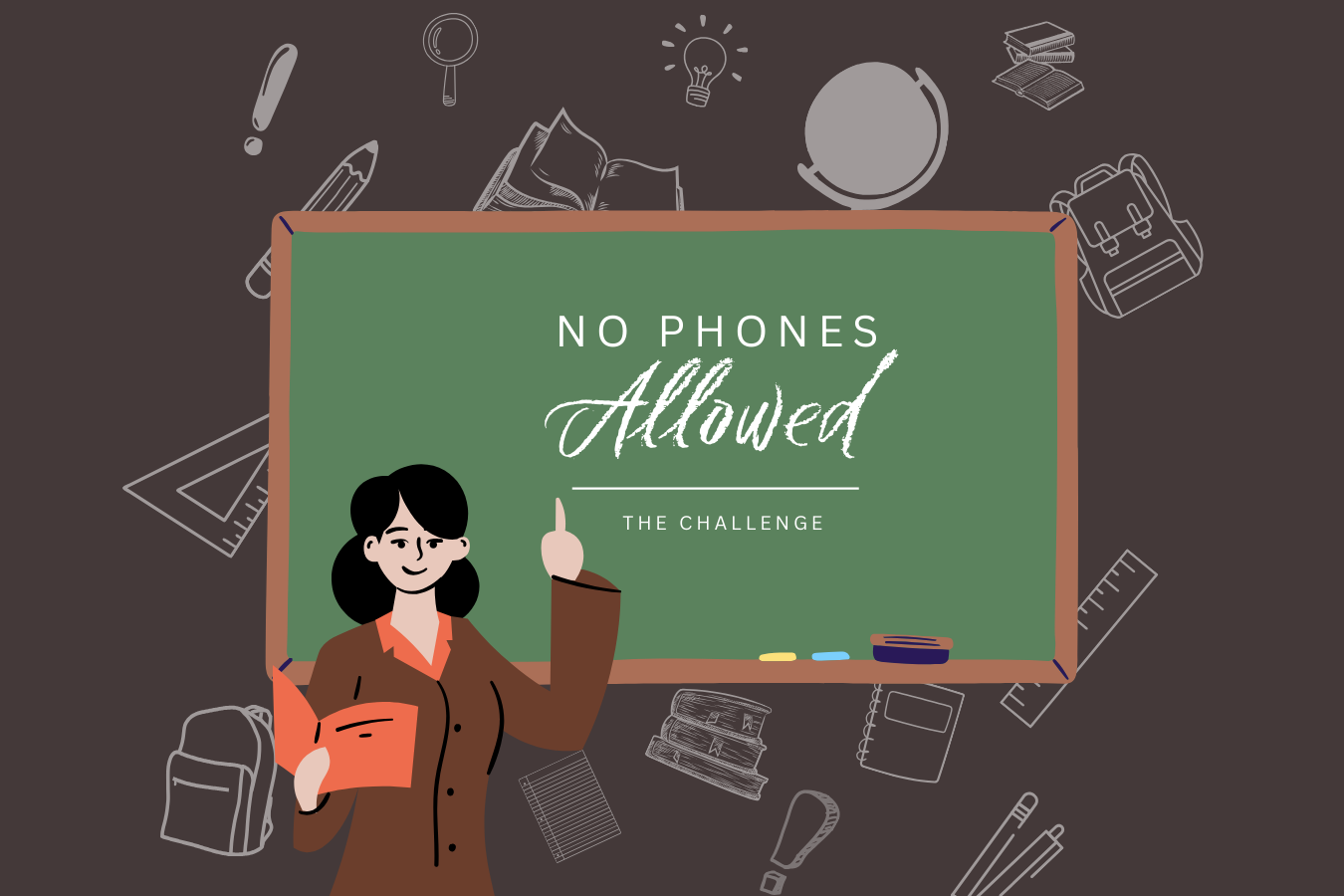In response to rising concerns about cell phones, Thunderbird High School, along with other Glendale Union High School District Schools, has implemented a strict new phone policy that bans students from having their phones in buildings during class hours.
Across America, schools are increasingly restricting phone use, citing issues like students being filmed without consent or distracted by online platforms. While the intention behind this is clear, reducing distractions and protecting students, it raises serious questions about whether this measure is necessary.
According to Thunderbird High School administrators, the phone policy is being executed in order to ensure “the best academic and social experience for students; issues surrounding the use of cell phones [are] distraction in class [and] misuse of cell phones.” This explanation is justifiable, as most teachers believe the new phone policy has helped some students become more focused during class, but all students should not be punished because a small group of students have a history of being distracted with their phones.

The current policy leaves too much discretion to individual teachers on how to enforce the policy. Some teachers allow students to keep phones in their backpacks while others require them to be locked away. Thunderbird’s decision to completely leave it up to teachers on whether phones are in students’ reach, whether in a pocket chart or locked in a Yondr pouch, may go too far. For example, a teacher at Thunderbird enforces the policy by having their students put their phones in a bucket for the entire class period. Keeping several students’ phones in a singular bucket is unsanitary and a breeding ground for bacteria with phones from each class period touching. All teachers should be required to have students put their phones only in backpacks. “I don’t want to have to take away phones; I want to trust my students as young adults to keep them put away,” said Ms. Pavlik, an algebra teacher at Thunderbird. Where students’ cell phones are during a class period should not vary by teacher. It is a simple compromise that maintains safety and accessibility without overreach.
While the concerns about cellphones in class are valid, banning phones entirely risks leaving students without access to communication in emergencies, severe or personal. A devastating result could occur if phones are locked away during a crisis. Arizona Supt.argued that, “Safety officials want students listening to the instructions being given to the class. They don’t want them to be talking on their cell phones in case of. Let’s say. a lockdown.” However, if a school lockdown does take place, a student might not be able to say goodbye to their loved ones if their phones are confiscated.
Teachers should be required to only allow phones in backpacks and address disruptions as they see fit. This way, students can still have access to their phones when needed, while maintaining a focus on education and safety.







Victor Silva • Feb 28, 2025 at 8:30 am
Great article, this week the Arizona House passed a cell phone bill (HB2484) that requires districts to adopt strict cell phone policies. I don’t know what will happen but I think that the use of cell phones has to do with the maturity and sense of responsibility of each student.
Aaron • Dec 9, 2024 at 8:52 pm
Read The Anxious Generation by Jonathan Haidt for more information. Your argument against banning cell phones ((1) it’s “unsanitary” for the phones to be in a single container, and (2) the students won’t be able to “say goodbye to their loved ones” in the event of an emergency) is incredibly weak. Students and parents may say they are grateful to be able to communicate in the event of an emergency, but that doesn’t mean the communication did anything to save lives. If communication in the event of an emergency is the concern, students can have a basic flip phone with no access to the internet. Studies have shown that students are generally not responsible enough to have a smartphone on them. They are tempted to use it, when they should be paying attention to instruction. Even with the smart device stored away in their backpack, studies have shown that the student is more distracted than they would be if the phone were at home.
Aaron • Dec 9, 2024 at 2:49 pm
The idea that banning cell phone usage on campus poses a safety risk to the students is ridiculous. Students didn’t have cellphones until the late 90s. And they didn’t have smartphones until after 2010. Is this really about their safety, or the parents’ anxiety?
If there were some sort of emergency on campus, how would a phone save a child’s life? Most children take out their phones to record their dangerous situation for social media. How is that safe? If this were truly about connecting with a child during an emergency, then give them a basic flip phone with no access to the internet.
The bottom line: the entire district needs to take a hardline approach, universally banning smartphones from campuses. This shouldn’t be left up to the schools or teachers to decide. There are no benefits for children to have smartphones on campus.
Carley Brown • Jan 17, 2025 at 9:51 am
Mr. Aaron, I am not writing this from a parents point of view so no it is not about their anxiety, it is about safety as I said. A phone would not save a child’s life in an emergency and I never claimed that it would. Thank you for your opinion!
W Pipkins • Dec 4, 2024 at 3:44 pm
Wonderful Article Carly ..so proud of you
Carley Brown • Dec 5, 2024 at 11:47 am
Thank you!
Mr. Chandler • Dec 4, 2024 at 9:28 am
I think the argument that it is a safety issue for kids to not be able to have cell phones in schools is an overstated argument. Decades of children have grown up without cell phones in schools and it was never a safety issue then. Similarly, in the event of a real emergency, no teachers are going to be taking phones from students huddled in corners of classrooms, or seeking shelter, etc.
Carley Brown • Dec 5, 2024 at 12:44 pm
Thank you for your feedback Mr. Chandler. I will give you more information on why I wrote this article. First, I made my argument about students not being able to have cell phones in schools during the case of an emergency because I did my research on students that have experienced school violence first hand and have said themselves that they wish they could’ve texted their parents, family, etc. Students that have experienced school violence first hand have also stated that they were grateful to be able to text their parents and family. Similarly, according to Tom Horne, the superintendent of Public Instruction whom I personally interviewed, in the event of a real emergency, schools are required to take students phones so that they’re not “distracted”.
Aaron • Dec 9, 2024 at 2:54 pm
You don’t need a smartphone to text your parents. Cell phones are not the issue. Smart devices with internet connection are the issue, and the distraction.
Carley Brown • Jan 17, 2025 at 9:49 am
Thank you for your opinion!
SV • Dec 5, 2024 at 6:43 pm
As a parent, I totally disagree with this new policy and appreciate how you are advocating for your peers. This new policy needs to be revamped for health AND safety issues! Times have definitely changed over the years so what may have worked for one generation will not necessarily work for others. Good read.
Daryl Little • Dec 3, 2024 at 10:45 am
It’s a great article and a great argument.
Carley Cataleya B. • Dec 5, 2024 at 11:41 am
Thank you Mr. Little!